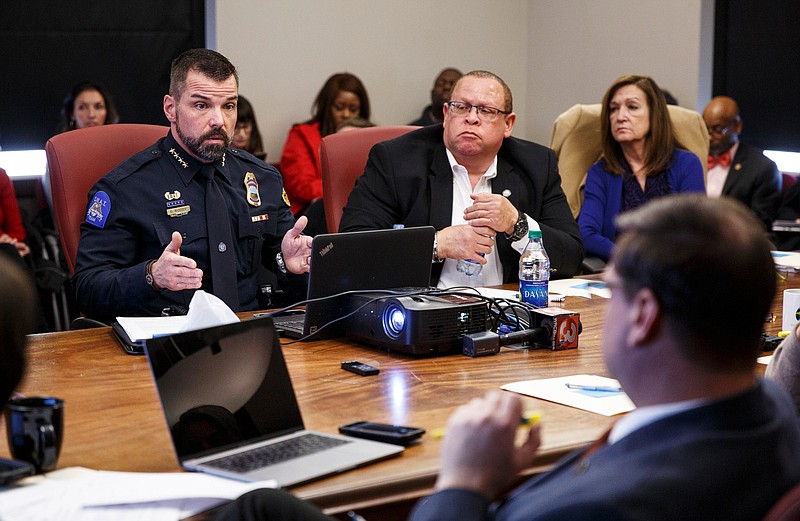NASHVILLE - While Chattanooga City Council members weigh creating the city's first independent police oversight board, a bill in the Tennessee Legislature that would place new restrictions on such panels cleared its first House hurdle on Wednesday.
The Republican-run Criminal Justice Subcommittee approved by voice vote the measure brought after Metro Nashville voters passed in November a charter amendment that created a police oversight board with subpoena powers and included specific diversity requirements for its members.
The action came after Nashville Mayor David Briley, a Knoxville police chief and the executive director of the city of Knoxville's Police Advisory & Review Committee urged lawmakers to refrain from restricting such boards' power in a sometimes heated exchange.
Briley, an attorney, said the bill sponsored by Rep. Michael Curcio, R-Dickson, "rejects the will, rejects the wishes" of the voters of Davidson County, "undermines the effectiveness of a board" and goes against the intent of the Tennessee Constitution.
House Majority Leader William Lamberth, R-Portland, a former assistant prosecutor who acknowledged he had become somewhat "emotional," told Briley that Nashville voters were "living in a fairytale land" by creating the 11-member appointed board, charging it was an "unelected tribunal."
The subcommittee approved the measure on a voice vote with two Democratic lawmakers from Memphis audibly voting no.
A day earlier, Chattanooga City Council members began weighing options to create an oversight committee after recent allegations of police misconduct. Among the topics were subpoena powers and diversity of its members.
Council members said although the legislation, which has the support of top GOP lawmakers as well as Republican Gov. Bill Lee, would affect a police oversight committee's power and certain operations, they don't want to wait for legislators before deciding the structure and membership of the committee.
"There are several ways to meet this need without worrying about the Tennessee Legislature," Councilwoman Carol Berz said.
Councilman Chip Henderson told the Times Free Press Wednesday members are to meet with the city's lobbyist on Tuesday "to explain the bill to us as he sees it, and explain the impact of what we're trying to do."
He noted he doesn't think the council will make a decision on moving forward "until we get a little bit more information from him [the lobbyist] concerning everything going on in Nashville right now. We're trying to figure out how to proceed."
A "lot of it will depend on what his report to us is," Henderson said. "If the state legislature is going to prevent municipalities from forming a citizens' oversight committee and/or restrict their limitations, then there's no reason to discuss those options."
Councilman Anthony Byrd said Wednesday he personally would like subpoena powers but also has questions about how it would work.
"It's always been an effort [by me] to get subpoena power, because every board that we look at, a lot of times that's the only teeth they have," Byrd said. "So it's 100 percent that [he would] want the board to have subpoena power."
As for the legislation's intent to bar local officials' ability to set aside specific demographic diversity provisions on board membership, Byrd said "to me, that's taken care of. That means I can get JJ, who's lived in the community for years and who's never been a police officer and get him training, and he can be on the board."
Since no one on the council has seen the actual bill and the diversity provisions, Councilman Russell Gilbert said, "that's one of the reasons we're going to discuss it Tuesday to understand what they're thinking of."
Gilbert said he believes more police oversight is needed.
"I think it basically gives more citizens more comfort to know there's more eyes looking at a situation," he said. "We have 95 percent great policemen, but we've got that 5 to 7 percent who need to go and we need to be sure that those who are not doing what they should be, they need to leave."
Rep. Mike Carter, R-Ooltewah, an attorney and former Hamilton County General Sessions Court judge, said the subpoena issue "is one of my clearly primary concerns" about police oversight boards.
By granting subpoena powers to an oversight board, Carter said, "you've in effect created two grand juries."
He noted "Remember if you want to appear before the Hamilton County Grand Jury, you can. If you want to hire a lawyer to specially prosecute a crime in Tennessee, you can."
Contact Andy Sher at asher@timesfreepress.com or 615-255-0550. Follow him on Twitter @AndySher1.
Contact Zack Peterson at zpeterson@timesfreepress.com or 423-756-6900. Follow him on Twitter @zackpeterson918.
